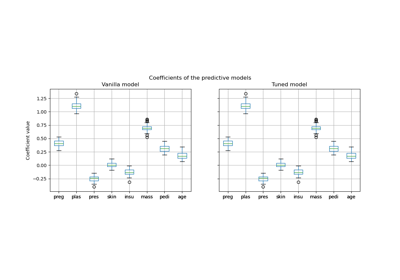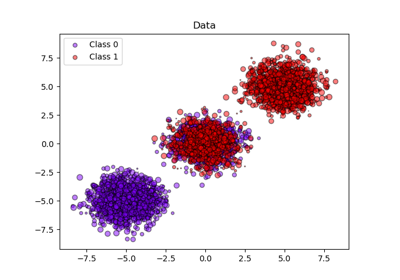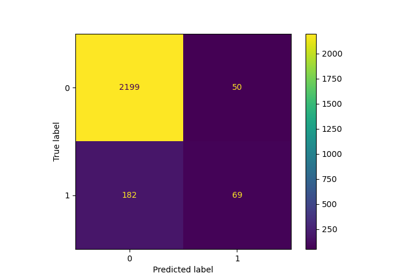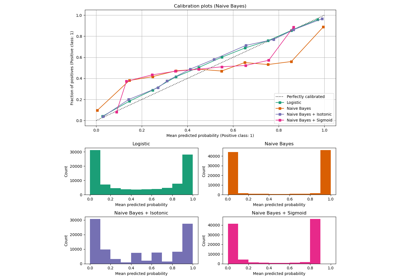Note
Go to the end to download the full example code or to run this example in your browser via JupyterLite or Binder.
Examples of Using FrozenEstimator#
This example showcases some use cases of FrozenEstimator.
FrozenEstimator is a utility class that allows to freeze a
fitted estimator. This is useful, for instance, when we want to pass a fitted estimator
to a meta-estimator, such as FixedThresholdClassifier
without letting the meta-estimator refit the estimator.
# Authors: The scikit-learn developers
# SPDX-License-Identifier: BSD-3-Clause
Setting a decision threshold for a pre-fitted classifier#
Fitted classifiers in scikit-learn use an arbitrary decision threshold to decide
which class the given sample belongs to. The decision threshold is either 0.0 on the
value returned by decision_function, or 0.5 on the probability returned by
predict_proba.
However, one might want to set a custom decision threshold. We can do this by
using FixedThresholdClassifier and wrapping the
classifier with FrozenEstimator.
from sklearn.datasets import make_classification
from sklearn.frozen import FrozenEstimator
from sklearn.linear_model import LogisticRegression
from sklearn.model_selection import FixedThresholdClassifier, train_test_split
X, y = make_classification(n_samples=1000, random_state=0)
X_train, X_test, y_train, y_test = train_test_split(X, y, random_state=0)
classifier = LogisticRegression().fit(X_train, y_train)
print(
"Probability estimates for three data points:\n"
f"{classifier.predict_proba(X_test[-3:]).round(3)}"
)
print(
"Predicted class for the same three data points:\n"
f"{classifier.predict(X_test[-3:])}"
)
Probability estimates for three data points:
[[0.18 0.82]
[0.29 0.71]
[0. 1. ]]
Predicted class for the same three data points:
[1 1 1]
Now imagine you’d want to set a different decision threshold on the probability
estimates. We can do this by wrapping the classifier with
FrozenEstimator and passing it to
FixedThresholdClassifier.
threshold_classifier = FixedThresholdClassifier(
estimator=FrozenEstimator(classifier), threshold=0.9
)
Note that in the above piece of code, calling fit on
FixedThresholdClassifier does not refit the
underlying classifier.
Now, let’s see how the predictions changed with respect to the probability threshold.
print(
"Probability estimates for three data points with FixedThresholdClassifier:\n"
f"{threshold_classifier.predict_proba(X_test[-3:]).round(3)}"
)
print(
"Predicted class for the same three data points with FixedThresholdClassifier:\n"
f"{threshold_classifier.predict(X_test[-3:])}"
)
Probability estimates for three data points with FixedThresholdClassifier:
[[0.18 0.82]
[0.29 0.71]
[0. 1. ]]
Predicted class for the same three data points with FixedThresholdClassifier:
[0 0 1]
We see that the probability estimates stay the same, but since a different decision threshold is used, the predicted classes are different.
Please refer to Post-tuning the decision threshold for cost-sensitive learning to learn about cost-sensitive learning and decision threshold tuning.
Calibration of a pre-fitted classifier#
You can use FrozenEstimator to calibrate a pre-fitted
classifier using CalibratedClassifierCV.
from sklearn.calibration import CalibratedClassifierCV
from sklearn.metrics import brier_score_loss
calibrated_classifier = CalibratedClassifierCV(
estimator=FrozenEstimator(classifier)
).fit(X_train, y_train)
prob_pos_clf = classifier.predict_proba(X_test)[:, 1]
clf_score = brier_score_loss(y_test, prob_pos_clf)
print(f"No calibration: {clf_score:.3f}")
prob_pos_calibrated = calibrated_classifier.predict_proba(X_test)[:, 1]
calibrated_score = brier_score_loss(y_test, prob_pos_calibrated)
print(f"With calibration: {calibrated_score:.3f}")
No calibration: 0.033
With calibration: 0.032
Total running time of the script: (0 minutes 0.017 seconds)
Related examples

Post-hoc tuning the cut-off point of decision function


